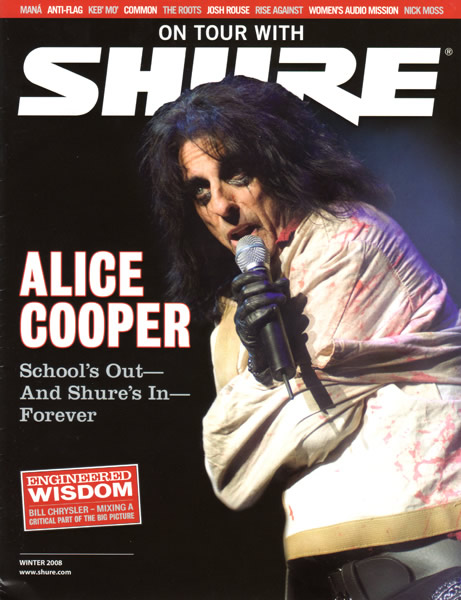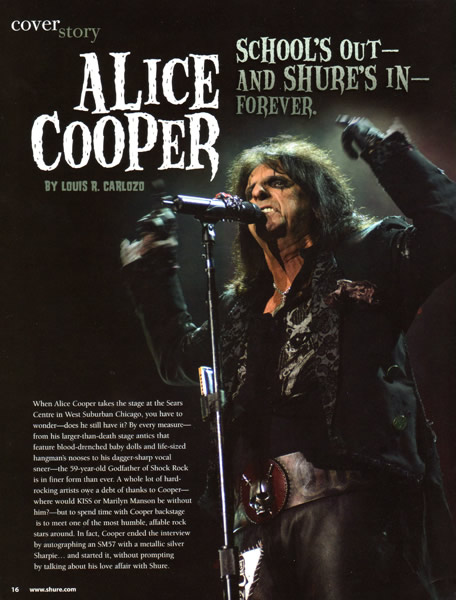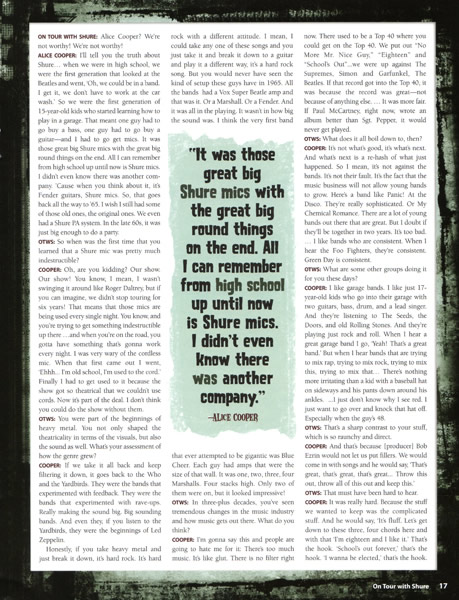Article Database
Alice Cooper
School's Out -- and Shure's in -- Forever
When Alice Cooper takes the stage at the Sears Centre in West Suburban Chicago, you have to wonder -- does he still have it? By every measure -- from his larger-than-death stage antics that feature blood-drenched baby dolls and life-sized hangman's nooses to his dagger-sharp vocal sneer - the 59-year-old Godfather of Shock Rock is in finer form than ever. A whole lot of hard rocking artists owe a debt of thanks to Cooper - where would KISS or Marilyn Manson be without him? -but to spend time with Cooper backstage is to meet one of the most humble, affable rock stars around. In fact, Cooper ended the interview by autographing an SM57 with a metallic silver Sharpie... and started it, without prompting by talking about his love affair with Shure.
On tour with Shure: Alice Cooper? We're not worthy! We're not worthy!
Alice Cooper: I'll tell you the truth about Shure... when we were in high school, we were the first generation that looked at the Beatles and went, 'Oh, we could be in a band. I get it, we don't have to work at the car wash.' So we were the first generation of 15-year-old kids who started learning how to play in a garage. That meant one guy had to go buy a bass, one guy had to buy a guitar - and I had to go get mics. It was those great big Shure mics with the great big round things on the end. All I can remember from high school up until now is Shure mics. I didn't even know there was another company. 'Cause when you think about it, it's Fender guitars, Shure mics. So, that goes back all the way to '65. I wish I still had some of those old ones, the original ones. We even had a Shure PA system. In the late 60s, it was just big enough to do a party.
OTWS: So when was the first time that you learned that a Shure mic was pretty much indestructible?
Alice Cooper: Oh, are you kidding? Our show. Our show! You know, I mean, I wasn't swinging it around like Roger Daltrey, but if you can imagine, we didn't stop touring for six years! That means that those mics are being used every single night. You know, and you're trying to get something indestructible up there... and when you're on the road, you gotta have something that's gonna work every night. I was very wary of the cordless mic. When that first came out I went, 'Ehhh... I'm old school, I'm used to the cord.' Finally I had to get used to it because the show got so theatrical that we couldn't use cords. Now it's part of the deal. I don't think you could do the show without them.
OTWS: You were part of the beginnings of heavy metal. You not only shaped the theatricality in terms of the visuals, but also the sound as well. What's your assessment of how the genre grew?
Alice Cooper: If we take it all back and keep filtering it down, it goes back to the Who and the Yardbirds. They were the bands that experimented with feedback. They were the bands that experimented with rave-ups. Really making the sound big. Big sounding bands. And even they, if you listen to the Yardbirds, They were the beginning of Led Zepplin.
Honestly, if you take heavy metal and just break it down, it's hard rock. It's hard rock with a different attitude. I mean, I could take any one of these songs and you just take it and break it down to a guitar and play it a different way, it's a hard rock song. But you would never have seen the kind of setup these guys have in 1965. All the bands had a Vox Super Beatle amp and that was it. Or a Marshall. Or a Fender. And it was all in the playing. It wasn't in how big the sound was. I think the very first band that ever attempted to be gigantic was Blue Cheer. Each guy had amps that were the size of that wall. It was one, two, three, four Marshalls. Four stacks high. Only two of them were on, but it looked impressive!
OTWS: In three-plus decades, you've seen tremendous changes in the music industry and how music gets out there. What do you think?
Alice Cooper: I'm gonna say this and people are going to hate me for it: There's too much music. It's like glut. There is no filter right now. There used to be a Top 40. We put out "No More Mr. Nice Guy," "Eighteen" and "School's Out" ...we were up against The Supremes, Simon and Garfunkel, The Beatles. If that record got into the Top 40, it was because the record was great-not because of anything else. ...It was more fair. If Paul McCartney, right now, wrote an album better than Sgt. Pepper, it would never get played.
OTWS: What does it all boil down to, then?
Alice Cooper: It's not what's good, it's what's next. And what's next is a re-hash of what just happened. So I mean, it's not against the bands. It's not their fault. It's the fact that the music business will not allow young bands to grow. Here's a band like Panic! At the Disco. They're really sophisticated. Or My Chemical Romance. There are a lot of young bands out there that are great. But I doubt if they'll be together in two years. It's too bad. ...I like bands who are consistent. When I hear the Foo Fighters, they're consistent. Green Day is consistent.
OTWS: What are some other groups doing it for you these days?
Alice Cooper: I like garage bands. I like just 17-year-old kids who go into their garage with two guitars, bass, drum, and a lead singer. And they're listening to The Seeds, the Doors, and old Rolling Stones. And they're playing just rock and roll. When I hear a great garage band I go, 'Yeah! That's a great band.' But when I hear bands that are trying to mix rap, trying to mix rock, trying to mix this, trying to mix that... There's nothing more irritating than a kid with a baseball hat on sideways and his pants down around his ankles. ...I just don't know why I see red. I just want to go over and knock that hat off. Especially when the guy's 48.
OTWS: That's a sharp contrast to your stuff, which is so raunchy and direct.
Alice Cooper: And that's because [producer] Bob Ezrin would not let us put fillers. We would come in with songs and he would say, 'That's great, that's great, that's great... Throw this out, throw all of this out and keep this.'
OTWS: That must have been hard to hear.
Alice Cooper: It was really hard. Because the stuff we wanted to keep was the complicated stuff. And he would say, 'It's fluff. Let's get down to these three, four chords here and with that 'I'm eighteen and I like it.' That's the hook. 'School's out forever,' that's the hook. 'I wanna be elected,' that's the hook. 'No more Mr. Nice Guy," So his job was to make us more simple. Now, once we got nice and simple, then he started giving us some songs that got very complicated. Orchestrated, classical. Songs like 'Steven" and "Welcome to My Nightmare" got really complicated. But first he made us be simple. The Beatles. Most incredible example. Think of the three most prolific songwriters you can think of. Burt Bacharach, Paul McCartney, and either Paul Simon or Brian Wilson. The most simple songs that you could write.
And yet the hardest thing to do is to write a simple song. Real easy to write a complicated song, but it's really hard to write a simple song.
OTWS: There's a lot of sifting that's involved.
Alice Cooper: You listen to a Beatles song, there's never anything in the way. The drums are always here, the guitar's here, the vocal's here, the bass is here, and nothing's fighting. Do you know how hard that is to do? Say with Burt Bacharach, with any of the songs that he wrote - nothing ever fights with anything else. It just goes and that's really hard to do.
OTWS: Speaking of hard to do, I've been watching you on stage, and you don't exactly stand still with the mic.
Alice Cooper: I'm in better shape at 59 than I was at 29.
OTWS: How do you do it?
Alice Cooper: I'm just in good shape, that's all. I don't drink anymore: 25 years without drink. I don't smoke, I never did smoke. So, physically that paid off at this point. I've been married 31 years. I'm not stressed out at all, and maybe that's what it is. And I' just love what I do. I think we have more fun on stage than the audience does. I try to keep the show really fun. It's hard and it's brutal and it's tough and it's rock -- and I wanna not let the band be wimpy. If I turn around I go [gestures with his hands to turn up the volume], I wanna hear a guitar! I only know how to do it one way - and that's hit the audience over the head with a sledgehammer. You know, give them a vaudeville show. My show is just rock vaudeville.
OTWS: And to that end there's a clear demarcation between the Alice backstage and Alice onstage.
Alice Cooper: Well... I play Alice! And there's no reason when I'm gone, there shouldn't be somebody else who plays Alice. I mean, Alice is like Zorro. You know, he's a character. He's up there with his sword and he's up there with his this and that, and he's Hannibal Lecter and little while and then he's Bela Legosi for a little while. I think that when I'm 90 years old, there should be some kid trying to play Alice. You know, he's got his own look, he's got his own makeup, he's got his own way of doing things.
OTWS: There's something very cathartic about watching it, you know?
Alice Cooper: You know what? There's a security about it. And I'll tell you why. It's like, we've been here 40 years. And proud to say, that I can't think of ever doing a bad show. So, if an audience has been following your show for 35 years or so, and every show they've gone to, they walk away going, 'Wow,' you're gonna build an audience forever. And you're gonna actually end up being woven into the sort of Americana. It used to be that Alice Cooper was the outcast. Alice Cooper is now Vincent Price. People feel very secure with Alice Cooper. He's an Americana, he's part of America.
OTWS: And the golf game is good still? You are said to be the best golfer in rock and roll.
Alice Cooper: Golf game is great. Tiger Woods said he wouldn't give me two a side. He could give me five a side and he'd kill me - but it was a nice compliment.
OTWS: One last thought: Your dad if I remember correctly, was a minister. How did that influence your stage show and your life?
Alice Cooper: My dad was a pastor. He passed away. My granddad was an evangelist. My wife's father is a pastor now. I was the prodigal son: grew up in a church, became the antichrist for a while, then came back to the church. You know, alcohol almost killed me and the church just brought me back, brought me back, brought me back. And I still do Bible study every Wednesday morning. It's so funny; the band comes back and there's a poker table - they play poker every night. And it's like, 'If anyone's late for rehearsal: Bible study.' No one is ever late for rehearsal.
OTWS: That's great to hear.
Alice Cooper: Thanks. For me, it's not that hard to live the life out here. Because I've done both and I know what the other one is. So, it's a challenge but it's also a fun challenge.
Originally published in the Winter 2008 issue of Shure Magazine.







